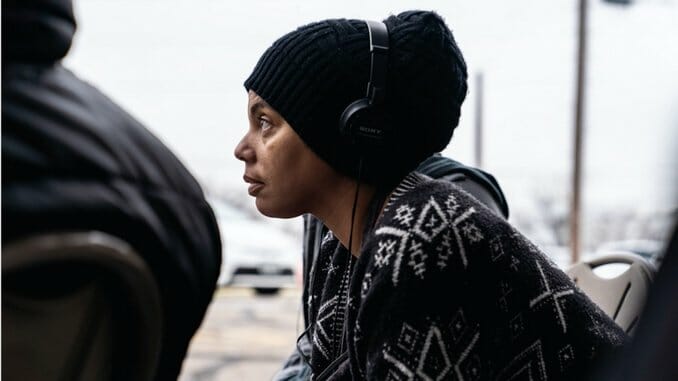Channing Godfrey Peoples on Capturing the Grit and Dignity of a Community in Miss Juneteenth

Channing Godfrey Peoples’ feature debut, Miss Juneteenth, is a multifaceted piece of work: It’s a portrait of black American life, a testament to black American pride and determination, a tribute to women like its protagonist, who work with such casual resolution that it looks as natural to them as breathing, and a homecoming for Peoples herself, who was born and raised in Fort Worth, Texas.
Miss Juneteenth tells the story of Turquoise Jones (Nicole Beharie), a single-ish mom busting her back at bars and funeral homes to make ends meet for her daughter, Kai (Alexis Chikaeze), who she’s in the process of grooming for the town’s upcoming Miss Juneteenth pageant. Turquoise won the crown herself years ago, and having missed out on the opportunities that winning would supposedly afford her, she’s fixated on securing the very same opportunities for Kai. But Kai has her own ideas of who she is, who she wants to be, and what she wants to do, which stirs up a parent-child clash as problems and pains pile up for Turquoise along the way.
Paste spoke with Peoples about putting the personal side of Miss Juneteenth on film, and the craft of naturalist filmmaking.
Paste Magazine: For me, this movie is so much about black American pride, and also a window into that experience for me as a white American. Was pride a conscious element on set while you guys were shooting?
Channing Godfrey Peoples: I think it was both. It was subconscious in the writing and then became much more conscious in rewrites and in imagining the film. As a filmmaker, what’s important for me is authenticity. I see the community that the film exists within with this sense of pride and dignity, so I’m glad to hear that you felt you got a sense of that in the film. It was important to show this community in the way I see it, in that it’s beautiful to me. It’s also a super personal film. I wanted to be able to acknowledge the pride of this community, the people of the community, and especially women like Turquoise, who are such a big part of my life. There’s so much of me in Turquoise, and my mom, my grandmother, my aunts, and also women in the community who I felt inspired and nurtured by.
Paste: You used the word authenticity. I thought a lot about the effort that was put into breathing life into this very specific place where the movie is set. So clearly the setting is really important to you.
Peoples: Absolutely. And I have a very naturalistic approach, so I wanted to make sure that I was able to capture as many details of the environment as possible. If I’d had my druthers, I would have wanted even more, but then we would be sitting there watching the movie for a much longer time. [laughs] So it was a constant discussion about how much world we were able to capture and how much world we could fit into the film. My producers—they were so wonderful—but they were constantly saying, “Okay, don’t worry, you’ll have more stories.” [laughs]
-

-

-

-

-

-

-

-

-

-

-

-

-

-

-

-

-

-

-

-

-

-

-

-

-

-

-

-

-

-

-

-

-

-

-

-

-

-

-

-








































